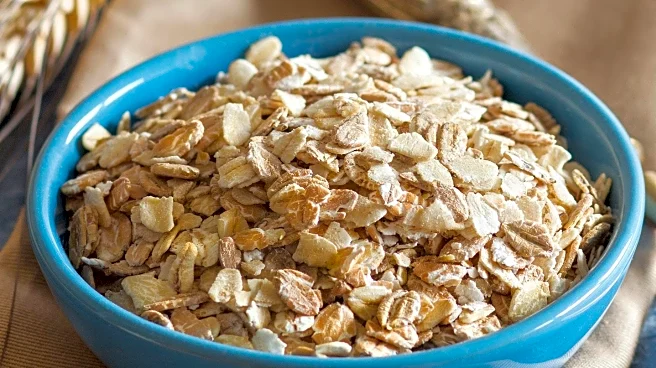What's Happening?
Dr. Bellardo, a practicing physician and graduate of Drexel University College of Medicine, emphasizes the health benefits of consuming a high-fiber diet. According to recent discussions, increasing fiber intake can significantly lower cholesterol, improve blood pressure, reduce diabetes risk, and protect against heart disease and inflammation. Despite these benefits, many Americans fall short of the recommended daily fiber intake of 25-30 grams, with less than 10% meeting these guidelines. Dr. Bellardo herself consumes about 90 grams of fiber daily, primarily from plant-based sources like edamame and mung bean pasta. The article highlights the common misconceptions about fiber, such as the belief that it causes excessive gas or bloating, which can often be mitigated by gradually increasing fiber intake.
Why It's Important?
The push for higher fiber consumption is crucial as it addresses several public health concerns. A diet rich in fiber is linked to a lower incidence of chronic diseases such as cardiovascular disease, cancer, and diabetes. Moreover, fiber plays a role in maintaining a healthy gut microbiome, which supports the immune system and reduces inflammation. The low fiber intake among Americans poses a significant risk for chronic health issues, emphasizing the need for dietary changes. Additionally, the environmental impact of dietary choices is noted, with plant-based diets being more sustainable compared to high-carbon animal products. This shift not only benefits individual health but also contributes to environmental sustainability.
What's Next?
To increase fiber intake among the population, public health campaigns and educational initiatives may be necessary to raise awareness about the benefits of fiber and how to incorporate it into daily diets. Healthcare providers might also play a role in advising patients on dietary adjustments. As more people become aware of the health and environmental benefits of a high-fiber diet, there could be a shift towards more plant-based eating habits. This change could lead to a decrease in the consumption of high-carbon animal products, further supporting environmental goals.
Beyond the Headlines
The discussion around fiber intake also touches on broader issues of dietary education and food accessibility. Many individuals may not be aware of how to properly integrate fiber into their diets or may lack access to high-fiber foods. Addressing these barriers is essential for improving public health outcomes. Additionally, the conversation about fiber highlights the intersection of diet and environmental impact, encouraging a holistic approach to health and sustainability.











